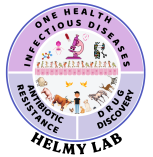Our lab is dedicated to protecting public health by enhancing food safety through a translational One Health approach. We investigate the prevalence, transmission, and persistence of foodborne and antimicrobial-resistant pathogens—including Salmonella, Campylobacter, Listeria monocytogenes, Clostridium perfringens, and E. coli—across the animal–environment–food continuum. Leveraging whole-genome sequencing, phenotypic assays, and spatial analysis, we identify contamination sources, characterize resistance determinants, and trace the pathogen flow from farm to fork. These efforts inform the development of targeted interventions, including next-generation probiotics, phage-based treatments, and small-molecule inhibitors, designed to reduce pathogen burden in food animals and food products without promoting antimicrobial resistance. Our translational pipeline moves from laboratory discovery to field validation in agricultural and veterinary settings. We work closely with stakeholders across the food system—including producers, processors, veterinarians, and public health agencies—to implement science-based interventions tailored to real-world challenges. Through training programs, curriculum development, and community engagement, we also build capacity in food safety, outbreak prevention, antimicrobial stewardship, and evidence-based risk communication. By integrating high-resolution pathogen surveillance with practical mitigation strategies, our lab bridges the gap between research and policy, creating safer food systems and strengthening public health outcomes locally, nationally, and globally.
